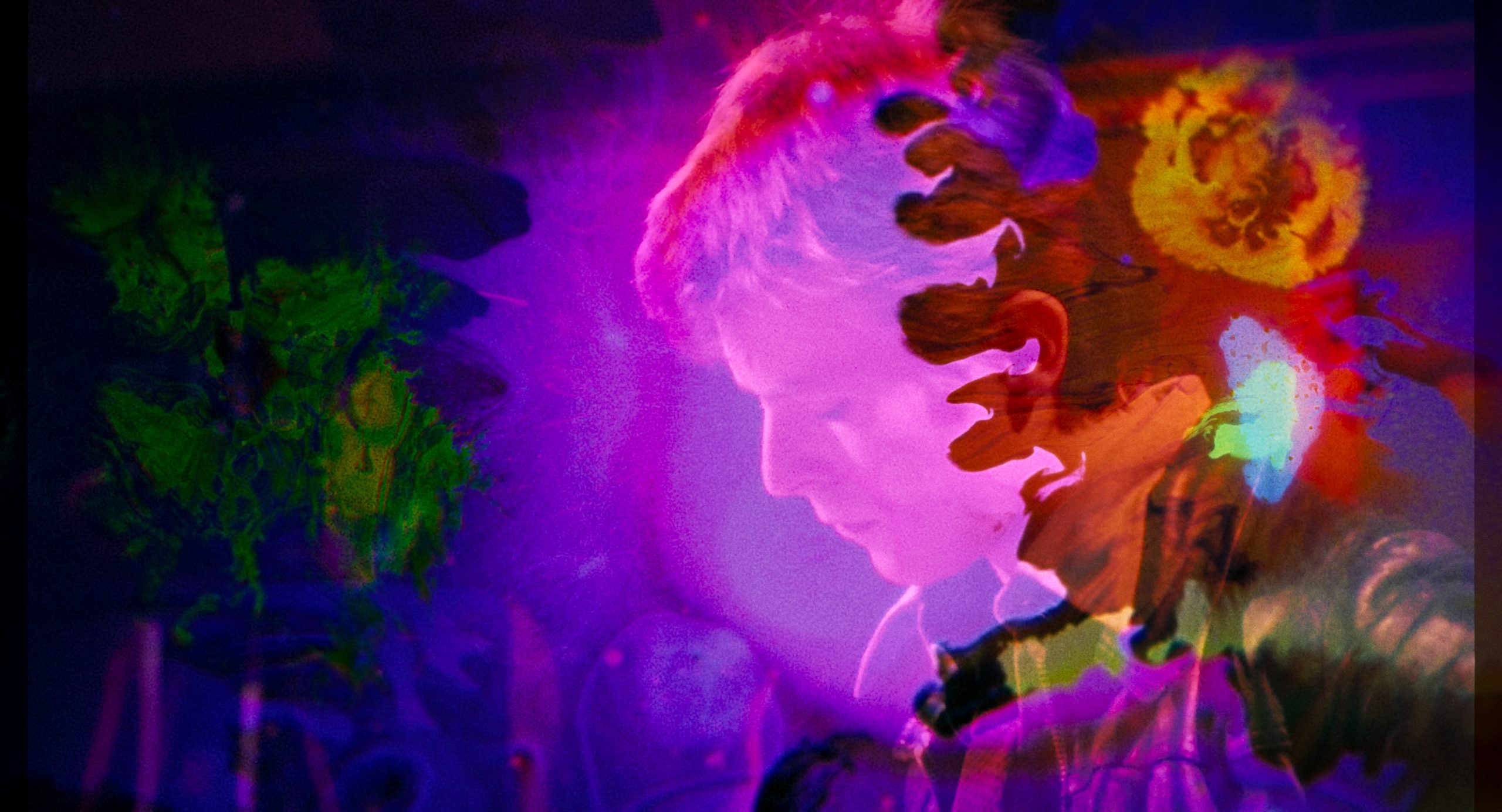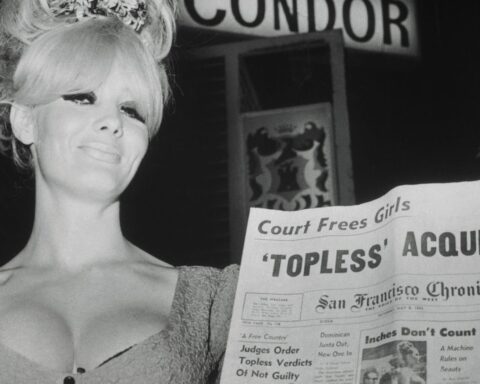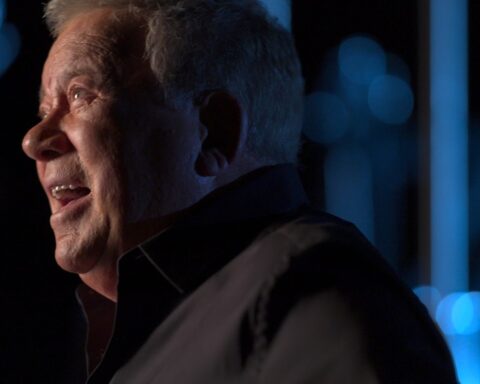Moonage Daydream
(USA, 140 min.)
Dir. Brett Morgen
What does one want from a music doc? Is it to be merely a biography, telling the tale of the rise and fall of an artist? Is it to be merely a celebration of a performer and their work, basking in the joys of their creation? Perhaps it will interrogate the artist’s place in the musical universe, or perhaps it will simply cater to fans. In some rare cases, a music doc feels like it is part of the artist’s own continuing vibrancy. Just as the light that reaches our eyes from the vastness of space is often from celestial bodies long dead, the effect that certain luminous stars can have even after they are gone is real and profound. Moreover, when you’re born blue and weathered, and burst just like a supernova, perhaps you can even walk like Brando right into the sun.
For over six years, Brett Morgen has been working on a documentary about David Bowie. The filmmaker behind Jane and Kurt Cobain: Montage of Heck had the enviable task of swimming in a sea of footage, with hundreds upon hundreds of hours of performances, behind-the-scenes moments, trimmings, and audio interviews in which Bowie participated during his career. There are restored selections from sublime concert films, with D.A. Pennebaker’s jaw-dropping Ziggy Stardust and the Spiders from Mars doing much of the heavy lifting.
We do not hear about “Laughing Gnomes,” but we do see selections right up to “Blackstar,” the 2016 album/performance piece that capped Bowie’s 26-album run. We do not see him prance with Jagger while covering Motown, but there are glimpses of him with Tina Turner shilling for Pepsi. There are wry comments uttered by a man who is never afraid to speak his mind, and there is, of course, one segment devoted to Bowie strumming a 12-string guitar to a throng of fans, singing of the oddity being lost in space, never to return.
Yet Morgen’s ambitions are higher than simply recounting Bowie’s output. First of all, it must be noted that Moonage Daydream is scheduled to be released theatrically, including on IMAX screens. It is, unlike the vast majority of contemporary music films, constructed with every frame and audio cue to be experiences on the biggest canvas possible. Sitting front row, dead center at the massive Grand Lumière Theatre in Cannes, the speakers shimmering with the audio onslaught, the experience was sublime. And yet, as locations like the Cinesphere in Toronto beckoned, I craved even larger canvases to travel even further visually into Bowie’s universe.
Bowie speaks of a “vortex of fragmented experiences,” and this seems to have given Morgen insight on how to shape the untellable. How do you sum up an artist as mercurial as Bowie? Album to album, setting to setting, ashes to ashes, funk to funky, Bowie made it his trademark never to stand still. He spent hours of interview time letting everyone know that fact. He refused categorization, save for being categorized as ever changing. He sought studios and locales away from whatever one could call home. Here he would cut and paste different elements together in ways he would describe as arbitrary and chaotic, impossibly creating new music, only to have the result be as melodic and, in retrospect, as coherent as anything he had done before and since. Like he often did on stage, there was a mask in front of Bowie, held up by a stick at a distance. It’s an obvious cover, but not really an effective one.
If there’s perhaps a lyrical key to unpacking Morgen’s mode of storytelling it may be found in “Starman”:
There’s a starman waiting in the sky
He’d like to come and meet us
But he thinks he’d blow our minds
There’s a starman waiting in the sky
He’s told us not to blow it
‘Cause he knows it’s all worthwhile
Fifty years ago, Bowie released this song as part of the Ziggy cycle, itself a kind of meta-commentary on rock-and-roll performance and the near messianic way that musicians of that era could commune with their audiences. It’s a song of hope and celebration, but equally implied is the Icarus warning about not getting too close to our heroes, lest our minds be blown (or our illusions dashed). It’s all worthwhile, but it’s not all there for us to see lest we blow it.
Moonage Daydream is most certainly not the biography of the man born David Jones. In fact, the one moment of the film that could/should be eschewed is when Bowie’s marriage to Iman is showcased very late in the story. This move comes dangerously close to letting the portrait lose its laser-like focus, and it invites too many questions about the previous relationships, children, abuses, and other quotidian things of almost every 1970s’ superstar. Looking past the corona of success, there’s a tale of drugs, excess, and debauchery, almost all of which is conveniently skipped. Through today’s eyes, this era ripe with sexual and pharmacological gluttony and abuse has been softened to the point of warm nostalgia and winking nods about stars being stars.
Instead, Morgen’s film is more like a celestial journey akin to the finale of Kubrick’s 2001 than anything else. This imagery of monoliths and celestial conjunction is explicitly referenced. The simple fact is that the stars aligned with Bowie, coming at a perfect time when his blend of sexually charged glam performance could thrive in a post-Beatles world, or when his gleaming, neo-soul pop and angularity in the 1980s could find him financial superstardom. His more esoteric later works would establish him as the old guard of the avant-garde, steadily manoeuvring his music and messaging in ways outside the mainstream, but still resonant to those tuned into his frequency.
Through use of animation, soundbites, performance clips, and hundreds if not thousands of stock images and visuals, Morgen’s film plays like an explosion of light and colour. Rapid-fire editing creates a kind of movement. Time has little meaning, as we bounce back and forth, occasionally voyaging past familiar landmarks but often merely spinning and spinning through Bowie’s various musical lives. We are caught within the musical vortex, but it’s not always chaos, with moments of calm introspection interspersed throughout.
Yet Morgen does something more subtle that may be under-appreciated to less discerning eyes, and that’s how he strips the man away musically more than he does with the biographical or visual details. Throughout Moonage Daydream, there are teases of songs, clearly derived from mult-itrack recordings stripped to their core elements. There’s a piano lick here, or a bit of a drum and bass intro there that underscore the words spoken by Bowie. Sometimes it’s obvious what’s at play, while one may struggle to hear the connection at other times until elements collide, like adjusting a telescope on that distant star until one can see more than a blur.
Told over 140 minutes, the result is a journey into the liminal space of Bowie’s artistic achievements. We soar through his musical productions, fuelled by his musings through both lyrics and interviews, comforted by the contradictions and feelings that are both profound and simply energizing. There’s an admission late in the film when Bowie talked about a love of early soul and rock-and-roll, enraptured by the lack of meaning he had from singers he couldn’t understand. Yet in the incomprehension, he felt something more profound than knowing. This, perhaps, is the key to fully getting into the vibe of Moonage Daydream.
To truly experience Brett Morgen’s wondrous film is to simply succumb. Sure, many may do so while under other psychochemical influences, but insofar as sound and vision are truly able to transport one to another plane of perception without the need for intoxication, Moonage Daydream is a mighty trip. More than that, it manages to be a very Bowie-esque take on Bowie, something the artist himself surely would have been ecstatic to experience.
With the dramatic fragmentation of shared musical taste, it’s increasingly rare to have someone of with the inherent musical and metaphysical curiosity of a David Bowie. Thanks to this remarkable film, there’s an opportunity for generations to come to be bathed in the light of his star. Something so ambitious, so fragmented, and so complex will certainly not be to everyone’s taste. For viewers willing and able to take the journey, however, this film is a dream. It’s a stunning, stellar celebration that elevates its subject through its narrative ambitions and formal quirks to establish Moonage Daydream within the constellation of David Bowie’s artistic legacy.
Moonage Daydream premiered at the 2022 Cannes Film Festival and will be released in theatres later this year.













